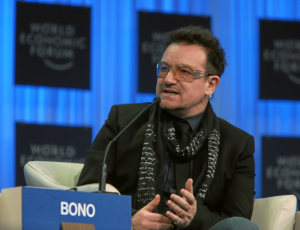The ONE Campaign

In 2004, Bono and Bobby Shriver co-founded the ONE campaign. It is an international non-partisan campaign that believes the fight against poverty is not about charity but bringing justice and equality. ONE aims to end extreme poverty and preventable diseases by 2030.
What ONE Is
ONE pressures governments, either through grassroots campaigns or lobbying with political leaders, to do more to fight extreme poverty and preventable diseases. The campaign is not government-funded, and is financed entirely by individual philanthropists and corporate partners.
The ONE campaign is made up of several celebrities and world leaders. U2- lead singer Bono and activist Bobby Shriver continue bringing in other leaders to aid in their efforts. The team, which includes former Prime Minister of the United Kingdom David Cameron and U.S. Senator Kelly Ayotte, works worldwide to fight extreme poverty. Volunteers make up the backbone of the ONE campaign. These volunteers mobilize education and advocacy efforts for people facing global poverty. Anyone can be a volunteer; artists, activists, students, leaders and celebs, including Ellen DeGeneres, Brad Pitt, Ryan Gosling, Liam Neeson and Jewel, are all working together to end extreme poverty and preventable disease by 2030.
Who ONE Helps
The ONE campaign aims to end extreme poverty mainly in Africa’s Sub-Saharan region where 51 percent of the world’s poorest live. The campaign fights for several issues including no poverty, zero hunger and gender equality.
To address zero poverty, ONE campaign leaders propose:
- Ensuring all students in low-income countries have basic reading skills. This could cut extreme poverty by 12%.
- Increasing the amount spent on key health interventions for women and children. The proposed amount is $5 per person per year to 2035 in 74 developing countries. This could yield 9 times the return on investment in economic and social benefits.
- Ending hunger. The percentage of undernourished people dropped from 19 percent in 1990 to 11 percent in 2014. The campaign aims to reduce it from 11 to zero percent by the year 2030 through lobbying and campaigning with governments to provide the necessary programs and resources to nations facing extreme poverty. A key element of ending hunger includes closing the gender gap in resource access. Global hunger numbers could be reduced by 100-150 million people if female farmers had equal access to agricultural resources such as fertilizers.
- Fostering gender equality. “In general, women spend 19% of their time in unpaid activities (including housework, child and elder care) versus just 8% for men. Unpaid care work limits women and girls’ ability to complete their education, learn valuable skills and pursue income-generating opportunities.” By addressing this issue and closing the gender gap “developing countries could yield between $112 and $152 million every year and boost global GDP by up to $28 trillion by 2025.” (These projections made pre-COVID-19 pandemic). In addition, girls receiving a primary education may decrease maternal mortality by 70% in Sub-Saharan Africa.
How ONE Helps
The ONE campaign took more than 23 million actions towards alleviating global poverty. ONE championed 35 policy changes, with more than 128,000 supporters mobilized in Abuja, Berlin, Brussels, Dakar, Johannesburg, London, New York, Ottawa, Paris and Washington DC educating and lobbying governments.
“In Europe, ONE has been a key part of several victories shoring up support for development. In March 2013, the UK became the first G8 country to reach the 43-year-old 0.7 percent target for international aid as a share of national income, which meets the commitment made by the coalition government after the general election of May 2010.”
Also, the ONE campaign played a large role in lobbying for a provision of the Africa Growth and Opportunities Act (AGOA) to pass. The provision “increases mutually beneficial trade ties between the U.S. and Africa and promises to lift people out of poverty and into employment and prosperity.” It passed the U.S. House and Senate in 2012
Since starting the campaign in 2014, Bono and Bobby Shriver have been working to bring in leaders and volunteers to join them in the fight against poverty. By mobilizing volunteers to educate and lobby governments, the ONE campaign has been able to influence a number of policy changes. These successes continue bringing the ONE campaign closer to its goal of eliminating extreme poverty by 2030.
– Danielle Beatty
Photo: Flickr
